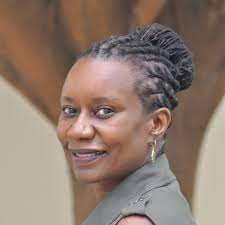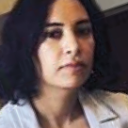I was lucky enough to catch up with Sarah Mukasa, Division Director, Women’s Rights at Open Society-Africa, in Entebbe, Uganda, after her plenary session ‘Strengthening an Infrastructure for African Philanthropy’ at the most recent African Philanthropy Network Assembly. Setting up our meeting was a bit touch-and-go because that week Kenya Airways disrupted many travel plans to the conference as pilots went on strike, so I wasn’t sure I would get to meet up with her at all while in Entebbe.
When we were able to cross paths, we chatted about the strengths and gaps in Africa’s philanthropic infrastructure, defining African philanthropy, why trust matters when it comes to philanthropy, and what she is taking away from the APN Assembly.
Ese Emerhi: Let’s start by trying to define what we mean by philanthropy from the African context. Is there a different meaning when we say African Philanthropy or Philanthropy in Africa?
Sarah Mukasa: I understand why we use both phrasing when talking about African philanthropy. If you are just focused on the geographical location, then perhaps you can talk about Philanthropy in Africa. But when you look at a much wider constituency that includes those in the diaspora, Afro-descendant communities from all over the globe, then perhaps African Philanthropy might be more appropriate. I think it’s a political choice and a strategic one, as well, depending on which phrasing you use. But also, it’s a statement of solidarity and understanding about the places we come from.
Addressing complex problems like the ones philanthropy is attempting to solve means we need to look more broadly at the entire ecosystem, the networks and organizations that all play different roles. If we are to be effective in driving positive change forward, then we need well-grounded African institutions ready to play their part. What’s been the biggest obstacle or challenge you’ve witnessed when working with African philanthropic institutions that are positioned to step into more strategic leadership or advisory role?
We shouldn’t get into the danger of looking at only a single construct of what an institution is – that is, the brick-and-mortar definition of an institution. What we really have in the ecosystem are the newer types of institutions that tend to be more visible (these are typically your social justice drivers, for instance), and many of them take a borrowed sense (typically from the North) of what an institution should like…things like having a board, producing annual reports, being registered, etc. However, there are longer traditions of giving, of solidarity, of institutional philanthropic culture and practice, that don’t take the shape of institutions from the North. African philanthropy ought to show the different kinds of giving, or to show how Africa views the act of philanthropy and giving. This, to me, is one form of social justice, because for many years we were not viewed as ‘givers’, just ‘takers.’
Moses Isooba with the Uganda NGO Forum asked a poignant question during one of the sessions yesterday and I’d like to borrow from his question and ask you this: when speaking about building the infrastructure for African philanthropy to thrive, should we focus on the hardware (building institutions that last) or should we focus on the software (skills, leadership, etc.)? Or rather, perhaps we should focus our attention on the scaffolding that holds the whole thing together? Which approach do you think would get us faster to the re-imagined world of the development sector?
It’s important not to view this as some sort of hierarchy… do you work on the software first, and then work on the scaffolding and then the hardware? It’s not really a linear process… as step one, step two, step three, and so on. Instead, we should view it all as part of a continuum. I do think that it is important we build up the knowledge, skills, and narrative we have in the sector because there’s an argument that there isn’t enough knowledge out there about African philanthropy, and so we must address this. And this work of building up knowledge is constant, it doesn’t stop.
We also need to take time to recognize old forms of African institutions or giving that has always been there – there may be no physical brick-and-mortar format for these institutions or ways of giving, but there’s a long tradition of practice in place. And even these old traditions of giving need to be protected, written about and practiced, or else they will die out. All forms of institutions – the traditional and the modern – need to take time to invest and in building the skills base for the future to be fit for purpose in the long term. We need to ask hard questions like ‘what will this practice look like in the next 10 years?’ It’s not just one approach – the hardware, the software, or the scaffolding – but all of it together. And it also depends on where you find yourself in that process, which approach you choose to focus on.
This moment we are in with African philanthropy is one where critical questions need to be asked – are we redefining philanthropy? are we building up philanthropy? are we taking up space and agency and charting a new path? And if we are in the mould of creating, would you say you are optimistic about where we are and where we are heading?
I’m very optimistic because we have come a very long way. Let me tell you about how we started with the African Philanthropy Network. We started as five or six organizations that made up APN: TrustAfrica, Kenya Development Community Foundation, Southern Africa Trust, African Women’s Development Fund, Urgent Action Africa, Foundation for Civil Society in Tanzania, and Akiba Uhaki from Kenya. All these organizations struggled at first to set up their own funds and struggled with questions thrown at them as African institutions. Questions like – ‘Are Africans ready to manage their own resources?’, ‘How do you deal with the issue of corruption?’, ‘Do Africans really understand how to run a philanthropic institution?’, ‘Isn’t this an elitist, pie-in-the-sky undertaking in Africa? When most people are living in poverty how can they be called on to give?’ and so on and so forth.
We are getting there in terms of changing the dynamic – we are building up our competence, we are producing knowledge, we are making visible the forms of giving and how they differ from global notions and paradigms.
And when we went out to the wider world, to other global conferences and discussions about philanthropy, there usually was nothing about Africa. Typically, it would be about what Americans were doing and learning, what the Europeans were doing, and if you were lucky, maybe what the Eurasia region was doing. No one seemed interested in what Africa was doing. And the general notion was that Africa’s only useful contribution to the global discourse on philanthropy was about how much it received in philanthropic support. That was the general sense of it all… 10, 15 years ago. It’s difficult to really describe the terrain as it was then – when conversations centred around ‘how best do we give to [Africa]?’ It wasn’t a hopeful time and place. It was even worse when we looked at the contributions made by African women. These were simply erased or invisibilised. And yet we knew, all of us women had struggled in contexts where there was nothing – no government, no social services, no markets etc, we knew that it was those women, themselves with very little, who kept communities going – took in HIV/AIDS orphans, conflict displaced children, and established feeding programs, gave them shelter and so on. This is still the case today.
So, while setting up APN, we gave ourselves several tasks. First, find out what philanthropy looks like in Africa. We had all been raised by others giving to us in Africa – our own people – so it was just wrong to say and assume that there was no giving in Africa. We needed to examine all the different traditions of giving and not to put one above the other, and to show to ourselves and the world that we give. When you look at the African Philanthropy Network now, you see we are no longer asking if Africans give (because we know we do), but instead we are now discussing things like the practice of philanthropy, knowledge exchange and building, and so on. Maybe now is the time for us, as Africans, to have the confidence to ask how do other people learn from our traditional ways of giving, including ourselves? There are important values that we can foreground in giving from our perspectives as Africans – we rarely give out of surplus, most who give are equally impoverished. Thus, in one context we are the giver and in another we are the recipient. The interchanging nature of that dynamic requires certain principles of trust building, respect and mutual accountability, joint decision-making about how resources are disseminated for example. Thus, how do we change existing practices for the better? And how, when we talk about community philanthropy, the currency discussed should be ‘trust’ and not money. This learning should be two-way – we learn from others and others learn from us.
We are getting there in terms of changing the dynamic – we are building up our competence, we are producing knowledge, we are making visible the forms of giving and how they differ from global notions and paradigms. We now have younger practitioners who are using technology to advance many of these principles and practices – discussions about creating greater awareness, shifts in power between North and South (North viewed no longer as the standard to which we must all aspire and conform, but rather as a useful reference point for learning and for solidarity) – all these are taking place now.
How can we continue to support institutions and networks like APN? Is the practice of giving to institutions outside of our immediate, familiar circle a new thing?
Let’s look at it from a historical context – over the last 50 or 60 years, our giving to public institutions on the continent have yielded very little trust and confidence… Just look at taxes – money is being taken but nothing substantial comes out of it to benefit your material life (here in Africa). We need to do a lot more to build up trust in that respect. For institutions like ours [APN], we need to lead by showing and by building up trust, because for the majority, that trust has been broken. We need to go back to the local ways of giving in community, where people have a greater say in how the funds are used and can see the benefits and have control about how to address the harms or shortcomings of decisions. The next challenge for us in this journey is about mobilising local resources for the modern form philanthropic institution, especially those seeking social justice. For all kinds of reasons this has proved difficult.
What is the currency of philanthropy in the context of Africa? It is trust… It is power with people and not power over people.
If we are to build this new system with trust at the centre, then in time, paying membership dues to institutions like APN and the East African Philanthropy Network and others – the African institutions – will come. But we also need to be patient – demonstrating worth and value takes years. If people value what this Assembly has done for them – the knowledge exchange, the networking, the insights – hopefully then people can follow up with financial support. At the same time, we should be careful about being exclusionary to people/institutions who may not be able to afford membership at this time. We could for example consider people lending their time and expertise as a form of payment of dues.
What do you hope attendees of the APN Assembly will take away from this year’s conference?
Well, I can tell you what I’m taking away from this conference! I am energized by the number of new faces at this year’s conference and working in the philanthropic field. I am energized by the creativity that people are applying in this field, including using technology to raise resources and tell the story of philanthropy on the continent to audiences globally. I am also energized by the challenge to us – not to think about philanthropy purely as money; we should think about philanthropy as a broad spectrum of things – time, talent, passion, contacts, networks, etc. I am just excited about all the knowledge and research that has happened over the last few years and can’t wait for where this would take African Philanthropy in the coming years.
Any last words?
What is the currency of philanthropy in the context of Africa? It is trust, because our experience of money and institutions has so far has not been a positive one. It is power with people and not power over people.
This conversation, between Ese Emerhi and Sarah Mukasa, took place on the sidelines of the African Philanthropy Network’s Assembly 2022 in Entebbe, Uganda in November 2022. The APN Assembly is held bi-annually, going back to the first one in 2010 in Nairobi, Kenya, which set the continental agenda on African Philanthropy. Since then, the Assembly has been held in Johannesburg, South Africa (2012), Arusha, Tanzania (2015), Mauritius (2018), and most recently in Entebbe, Uganda (2022). The Assembly is an opportunity for philanthropic practitioners to celebrate ideas and share practical solutions of African-generated and African-owned philanthropy, and to make recommendations to unlock the full potential of philanthropy in driving social and systemic change.





Comments (1)
Dear friends, Sarah's reflections about African Philanthropy recalls founders of APN who were also seminal in creating a new pathway to tackle issues she is raising. Years before, at an NGO meeting in Uganda they and others initiated a process leading to Dr. Bheki Moyo establishing The Centre on African Philanthropy and Social Investment (CAPSI) at Wits University. A signature feature of CAPSI is drawing on Africa's own evolution and culture of trust-based 'gifting' that migrated across the world: a pro-social behaviour found everywhere that has been re-crafted and renamed, overshadowing its origins. Today CAPSI creates continent-based knowledge and examples of philanthropy, fosters pragmatic human capital and is a place to reinforce and service networks on and beyond the continent. It is a resource that also faces the problems of resourcing, but shows how resourcefulness can make a difference. Becoming familiar with CAPSI can show creative ways to reinscribe Africa's own story when overcoming challenges faced by APN members and others with similar agendas. Go the website and join in the rediscovery of African philanthropy. https://capsi.co.za/